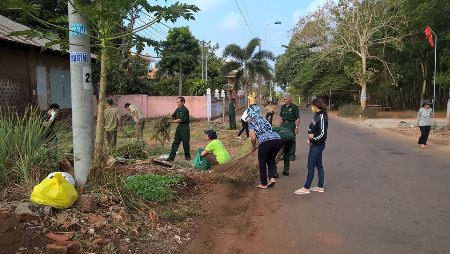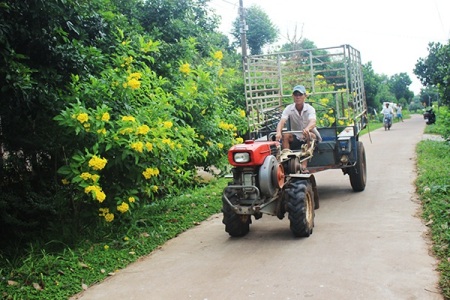
Unions, associations and local people are cleaning
up the environment
One of the important criteria on environmental
protection for new rural construction is to ensure the criteria for people to
use clean and hygienic water. Up to now, the province has focused on investing
in many clean water supply projects for people through mobilizing funds from the
State, businesses and people. Currently, the province has 105 rural concentrated
water supply systems with a designed capacity of more than 11,000 cubic meters
per day and night and the rate of rural households using clean water reached
72.8%, up by 30.66% compared to 2011.
According to the provincial Department of
Agriculture and Rural Development, the set goal until 2020 is that 80% of the
province’s rural population will have access to clean water that meets the
QCVN02 standards of the Ministry of Health while the conditions of resources and
management and exploitation of projects have not met needs and proved not very
stable and ground water and clean water are increasingly scarce. In the coming
time, to strive for 80% of rural people to have an access to clean water the
province will step up it socialization; develop and expand the market of clean
water supply and rural sanitation; call for the participation of all the
community and economic sectors, especially the private economic sector in the
investment in clean water systems through capital and tax support policies.
Also, it is essential to assess, review and update the master and detailed
planning on supplying rural clean water as a basis for developing short-term and
long-term plans; pay attention to applying various technologies, exploiting and
using water sources and improving water quality in conformity with each
locality’s economic, natural and social conditions; and ensure sustainable
principles, especially giving a priority to seeking for and taking an advantage
of stable water sources for the extremely difficult and densely-populated areas.
Besides clean water issues, waste collection and
treatment is also one of the important criteria for the success of building a
new and improved countryside today. According to the provincial Department of
Natural Resources and Environment, environmental protection issues in rural
areas were unsettled and domestic waste was not collected and treated in
accordance with regulations, which created ugliness and caused complaints among
people, many solutions have, in recent years, been disseminated to each
household by management agencies at the provincial and district to communal
levels along with the province’s enclosed guidelines and policies. Besides,
localities have effectively disseminated propaganda information on protecting
the environment in socio-political organizations and unions to people through
various forms as well as mobilized social resources for environmental
protection.
Collecting, transporting, and treating solid,
ordinary and hazardous waste are increasingly tightened. In particular, ordinary
solid waste will be sent to concentrated treatment areas as places for treatment
by burning, composting and applying hygienic burial methods to eliminate local
temporary landfills; packages of plant protection products are collected and
destroyed at specialized incinerators; Dong Nai has installed about 1,149 plant
protection products collecting tanks; 100% of communes have organized their
daily-life waste collection; and the rate of collecting domestic waste in rural
areas reaches 98%. The environmental protection in production, business,
services and livestock activities has been paid more and more attention to; most
of production and business establishments and livestock households have
basically complied with the law on environmental protection and invested in
building waste treatment facilities to ensure hygiene; and the highlight of
environmental treatment in rural areas is that the province has encouraged and
mobilized capital from many economic sectors and called for their participation
in environmental protection, and invested in concentrated waste treatment plants
in some districts such as Thong Nhat, Vinh Cuu, Cam My, Trang Bom, and so on.

The province’s rural environment is increasingly
changing
There are currently 16 investment and construction
projects in the province and suggested locations for their investment in 9 solid
waste disposal complexes as planned have been introduced with 9 projects having
been received for waste treatment, meeting the collection and treatment of
daily-life solid waste that is generated among people. In addition, 31 out of 31
active industrial parks have basically completed the construction of their
wastewater treatment systems with a total design capacity of 172,000 cubic
meters per day, reaching 100%. Particularly, 25/25 industrial zones have a
stable centralized wastewater treatment system that are operating stably and
automatic monitoring stations have also been installed to monitor the quality of
treated wastewater and transmit data to the provincial Department of Natural
Resources and Environment for monitoring the results of environmental quality
(soil, water, air) and maintaining a good quality. Environmental quality and
waste sources are strictly controlled and monitored.
The provincial Department of Natural Resources and
Environment added, in a context that having domestic waste treated by burial
methods is no longer considered an an optimal method because of low treatment
costs to improve waste treatment segregating waste at source in rural areas is
promoted to reduce treatment costs, reuse valuable waste, utilize heat in the
process of treating post-segregation waste by incineration methods, and reduce
landfills. Based on the initial efficiency in the segregation process of waste
at source, the province has issued a master project to segregate domestic solid
waste at source in Dong Nai province in the period of 2016-2020. After 3 years’
having waste segregated at source, a lot of positive changes have been made to
contribute to raising people’s awareness of sorting solid waste and disposing of
waste at the right place.
According to the statistical results of phase 1 of
the project in the period of 2016-2018, the province has conducted a pilot
program in 40 communes and wards with more than 29,000 households that have
registered for it. The total volume of solid waste generated is 1,838 tons per
day and the volume of solid waste collected and treated is 358 tons per day
including organic solid waste for making compost and 31 tons of solid waste are
recycled and treated by burial or incineration methods every day. In the second
phase, the project is expected to be widely deployed in all over the province
with such participants as the People’s Committees of communes and wards,
hospitals, supermarkets, markets, food and beverage establishments, trade
centers, and so on. Especially, it is essential to further disseminate
propaganda information on how to segregate domestic waste at source and
coordinate with localities to pilot the establishment of hazardous waste
recovery points and maintain such activities as waste recycling festivals,
providing guidance manuals and documents on how to segregate waste at source,
collect and dispose of pesticides at a right place.
Duy Minh (Thanh Ngoc)